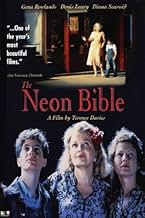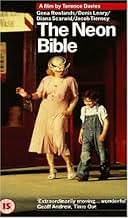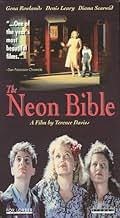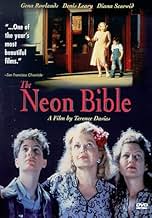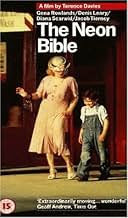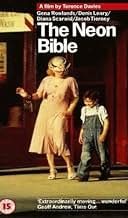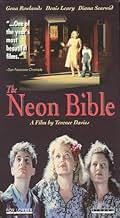अपनी भाषा में प्लॉट जोड़ेंWhile on a train, a teenage boy thinks about his life and the flamboyant aunt whose friendship acted as an emotional shield from his troubled family. This film evokes the haunting quality of... सभी पढ़ेंWhile on a train, a teenage boy thinks about his life and the flamboyant aunt whose friendship acted as an emotional shield from his troubled family. This film evokes the haunting quality of memory while creating a heartfelt portrait of a boy's life in a rural 1940s Southern town... सभी पढ़ेंWhile on a train, a teenage boy thinks about his life and the flamboyant aunt whose friendship acted as an emotional shield from his troubled family. This film evokes the haunting quality of memory while creating a heartfelt portrait of a boy's life in a rural 1940s Southern town.
- पुरस्कार
- 1 जीत और कुल 2 नामांकन
फ़ीचर्ड समीक्षाएं
The movie has an odd filming style that didn't make it feel like a movie from 1995, instead it felt like it had been filmed in the 60s or 70s. Long, awkward shots, sets that were very clearly sets. I think the director was often going for something that felt ethereal and nearly dreamlike, which I guess makes sense since the movie is told as a memory. I didn't like the style of the movie at all but I'm sure there are some people out there who would enjoy it just because it isn't your standard film experience.
The main character is such a vacuum of personality. I only saw this a day or two ago and I can remember next to nothing about him. He's a soft child, deliberately so, so much so I was waiting for a reveal that he was gay but at least at the part of the movie I got to, that hadn't happened. It just seemed to fit with the rest of the narrative covering religious con-men, racism and the general sexism of the 1930s-50s in the deep south.
The father was a non-character for how little screentime he had in it except to be a bully who very quickly was disposed off in quite and unceremonious way. The mother as well was very much a non-character, going from pretty bland to 'insane' seemingly at the drop of the hat when the father left the movie. I thought they were really going to hammer in the point that he was the main bread winner and now they were alone, but their living situation never seemed to change except the mother now awkwardly stared at the camera for minutes at a time singing.
The Aunt is the main driving force of the movie as the boy's only friend. A city woman apparently slumming it in the south once her mediocre career as a bar singer ended. It's weird how they display her though, early on she's hated by the father because she dresses 'slutty' to a party and humiliates them in front of the town, allegedly but then for the rest of the movie, no one ever brings that up again and everyone seems rather content with her being around and she seems to become quite a major part of the town of heavily religious people who go to rallies calling out women who sing in bands... which would be her specifically, but no one seems to acknowledge that. They do make the point that because of this 'low standing' she has in society, she is used by men, they don't respect her at all and use her for a bit of fun before dropping her.
I had a problem with timescales in this movie. The boy starts as a child and an amount of time passes before a transition where he suddenly is a teenager and then an amount of time passes before I gave up. The timescale is all over the place which means that the story crawls along at times and then suddenly speeds by. World War 2 is covered in the space of about 2 minutes which is crucial to several characters and probably covers months of time. The 'racism' element shown was a 5 second cut away of the boy being taken to a lynching by his father, and it seriously is gone in seconds. The sexism and religious fear is covered more in depth with a rally but even then the movie is so blunt and heavy handed they make sure to show the religious preacher standing there going "Hahahah, so many suckers, I am going to milk them for so much money, hahahahaha." before going into the sermon. So, WW2 which has massive implications on the entire family is covered with basically one voice over narration but the religious conman scene is a solid 10 minute rally that seemingly has no long lasting effect on the plot.
This isn't the usual type of movie I would go for but I like to try new things occasionally. This was just quite a disappointment. Most movies I drop before finishing get an automatic 1 but I felt bad doing it for this movie because there were some odd elements in it that kept me vaguely interested since I had been originally thinking of dropping it 30 minutes in but the religious conman scene kept my interest for about another 20 or so minutes.
The resulting film is disjointed, episodic and because of how internalized David is the plotting is hard to fully grasp. I am not sure if the plot is understandable if you *haven't* read the book. The material is about the oppressive nature of small town life for different people-especially fire and brimstone religion-builds up anger and resentment that comes out in violence. That comes across in the film if you know you are looking for it. If you not I think much of the film will be esoteric.
I ultimately ended up liking the film on the level of the companion to the novel. It helps a lot that I rather like the book and there's not much different in the works. The cinematic qualities are fairly good-if a little TV production. The melancholy of the novel comes through loud and clear.
Overall I am glad this film exists but it could have been better.
So, I was naturally quite excited when I stumbled upon the DVD release of this movie; I wasn't even aware that any of Toole's work had been adapted to film. But I was also a little wary. Movies have a tendency to trivialize great books, and I predicted that "The Neon Bible" might, in cinematic form, degenerate into a depressing slog.
Alas, my prediction proved true. This movie is a slog. Director Terence Davies paces it like a funeral procession. He also fills the movie with weird, protracted shots of blackness, of whiteness, of starry skies; I imagine he's trying to be deep somehow, but all his slow zooms just bore me. Besides, at times he overplays the starry sky thing so much that it looks like the protagonists live in a cabin in outer space.
Both the book and the movie are anecdotal, but the book works because David - the shy teenage "hero" - makes an interesting narrator. His voice binds the anecdotes together, and naturally the reader learns about him through the narration. In this movie, though, he's largely silent; he just lurks around in the background of his own story. And, without his narration, the anecdotal scenes often make little sense and have no apparent connection.
I feel guilty about badmouthing this film, to an extent, because it at least strives for faithfulness. But the deadly slow pace really undermines everything. For instance, there's a Christian rally at one point, headed by an evangelist called Bobby Lee Taylor. In the book, this is a rousing set-piece, and Taylor is depicted as an energetic young man who really seems to believe the (ahem) propaganda he spouts. But, in the movie, Taylor is depicted as a lifeless old man, and he basically announces to the audience in an aside that he's a shyster. Ho-hum. That's the Hollywood trivializing machine at work. And the scene as a whole completely lacks energy, verve, oomph - whatever you want to call it.
This is going to sound like a strange statement, but I'm starting to develop a love-hate relationship with movies, with the emphasis on hate. It's always easy and tempting to pop a DVD in my player and relax for the evening, but I find lately that I get a lot more out of indulging in the brain-stimulating alternative pastime of reading. After all, books are, on the whole, lots better than movies. Case in point..."The Neon Bible."
I still can't stop hoping that, one day, they'll make a movie version of "Confederacy of Dunces." But I bet that'll be inferior to the book, too.
Edward Guthmann said the film was poorly received when it premiered at Cannes, but called it "gorgeous" and "one of the year's most beautiful films." He said it was a rewarding film that requires a little faith from the viewer due to long, slow, "lingering shots that work as a kind of meditation." He described the revival meeting at night "like an Edward Hopper or Thomas Hart Benton painting come to life." I will grant the film that it looks beautiful, but it lacks a deeper substance which would be necessary to make this a great film.
Director Terence Davies said "The Neon Bible doesn't work, and that's entirely my fault. The only thing I can say is that it's a transition work. And I couldn't have done The House of Mirth without it." I appreciate that he is humble enough to admit this is not his best work. Again, the film looks brilliant, so it's far from a complete failure. And you have to respect the brave casting decision that brought Denis Leary, not known for his subtle acting, on board.
क्या आपको पता है
- ट्रिवियाIn an interview with "Time Out Film", Terence Davies said about this film, "[It] doesn't work, and that's entirely my fault. The only thing I can say is that it's a transition work. And I couldn't have done The House of Mirth (2000) without it."
- भाव
David, aged 15: If you were different from anybody else in town, you had to get out. They used to say in school, "you have to think for yourself," but you couldn't do that in town. You have to think what your father thought and that was what everybody thought.
- कनेक्शनFeatured in Fandor: Cannes You Dig It? | Fandor Spotlight (2022)
- साउंडट्रैकOh Lord, How Long?
Traditional
टॉप पसंद
- How long is The Neon Bible?Alexa द्वारा संचालित
विवरण
बॉक्स ऑफ़िस
- US और कनाडा में सकल
- $78,072
- US और कनाडा में पहले सप्ताह में कुल कमाई
- $5,045
- 3 मार्च 1996
- दुनिया भर में सकल
- $78,072
- चलने की अवधि1 घंटा 31 मिनट
- रंग
- ध्वनि मिश्रण
- पक्ष अनुपात
- 2.35 : 1

